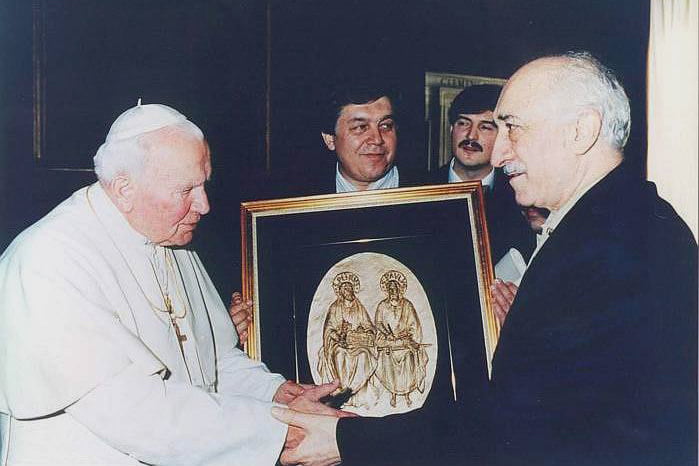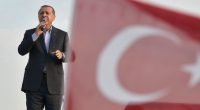[Alleged] “Coup leader” Gülen’s friendships with the Catholic Church

Date posted: July 25, 2016
GIANNI VALENTE, ROME
In recent months, the campaign launched by Turkey’s nationalist newspapers against the preacher and the Hizmet movement has often dragged their relations with the Catholic Church into it. That includes relations with the Holy See.
In the fierce reaction triggered by the failed coup which took place on the night of July 15th, President Tayyip Erdogan and his power apparatus pointed to Hizmet – the international movement headed by Islamic preacher Fethullah Gülen – as the “powerhouse” of the anti-Turkish coup plot. In actual fact, all of Erdogan’s propaganda channels and instruments have been referring to Hizmet (“Service” in Turkish) as the “Gülenist Terror Organisation” for years and have blamed it for attacks, kidnappings, the targeted killing of “enemies” and other failed attempts to illegally overthrow the Turkish government. Over the past months, this full-fledged criminalisation campaign has often seen relations between the Hizmet network and the Catholic Church – including the Vatican – being dragged into it. This has primarily been witnessed in the most staunchly nationalist press channels.
Relations between Fethullah Gülen’s movement and the AKP, the Justice and Development Party that brought Erdogan to power in 2002 give a precious clue in the attempt to decrypt the enigmatic political and geopolitical dynamics seen in Turkey in recent years. The AKP has received Hizmet’s backing for a long time and Hizmet’s influence on the judiciary has gone some way to weakening the opposition and the military. Today, says analyst Nat da Polis, Erdogan points to Gülen as his number one enemy, “despite the fact the latter had once been his spiritual father”. Hizmet’s charismatic leader fled to Pennsylvania back in 1999 because he was being persecuted by Turkish generals. In the years that followed, his network was instrumental in portraying to the West an image of Erdogan and the AKP as the creators of a Turkish political Islam that advocated conservative democracy, a Muslim version of Europe’s people’s Parties (the AKP was also an observer member of the European People’s Party from 2005 to 2013, before supporting Eurosceptic group Alliance of European Conservatives and Reformists).
At that time, the perception of a Turkish Islam that was open to modernity and co-operation with other religious traditions, also rested on the many initiatives launched across the world by Hizmet affiliates to encourage dialogue and co-operation with Catholic institutions and groups. In recent years, however, it has been these very initiatives – following the split and in light of the increasing hostility shown by Erdogan’s apparatuses against Gülen and his own apparatuses – that have been slammed and often twisted by pro-government media outlets, which pass them off as further evidence of the “global” connivance of the Gülenist conspiracy.
Incidentally, in recent months, newspapers famed for giving voice to the most extremist expressions of nationalist sentiment had increased the number of articles that criticised collaborations, partnerships and financial sponsorships offered by the Gülen network to Catholic-owned academic and social bodies. On 13 July, two days before the failed coup, Turkish newspaper Yeni Akit published a report about Gülen’s network allegedly allocating 3, 5 million dollars’ worth of donations for the construction of two churches, one in Texas and one in Australia. “Gülen,” the authors of the report said, “offers a new religion with a taste of its own, a mix of Christianity and Judaism, without any concern for the reactions of the Islamic world, a choice the Vatican will appreciate”. The previous week, Daily Sabah (a paper that was created specifically in 2014, to counter the anti-AKP press campaigns) informed its readers of an elusive operation set up by the “Fethullah Gülen terrorist organisation” with the Catholic university of Leuven, which was said to have received 1 million dollars’ worth of donations from the Gülenists to “train Imam supporters” who would substitute those sent to Belgium and Turkey.
At the end of June, Aksam, a historic newspaper recently purchased by the government apparatuses, published a story about a complaint filed by a Californian NGO named after St. Francis of Assisi, with a US court – spurred on by Catholics of the Iraqi diaspora – against Turkish financial institutions accused of bribing Islamic State jihadists. The article talked about links between the NGO and Gülen’s movement, forged in an attempt to make the complaint look like an anti-Turkish operation inspired by Gülen’s “parallel State”. The newspaper underlined that Hizmet affiliates often refer to the Saint of Assisi in their speeches and organise joint meetings and conferences with Catholics “in favour of interreligious dialogue”.
In mid-June, Yeni Akit published another article, this time on the businessman Alaaddin Kaya, who was recently arrested for his involvement in the anti-corruption campaign of December 2013, which led to the resignation of four ministers and which the government is now presenting as a first attempt at a coup, staged by Gülen’s former ally. The article said Kaya’s efforts to keep a distance from Gülen were “not sincere” and recalled the role he played in organising Pope John Paul II’s meeting with a Hizmet delegation headed by Gülen himself, in Rome on 9 February 1998.
Gülen’s visit to the Polish Pope who had been attacked by the Turk Ali Agca, is often mentioned in the conspiracy theories of Turkish ultra-nationalists, as conclusive evidence of the treacherous anti-national “syncretism” attributed to the Islamic confraternity. But in their all-out war, Gülen’s attackers also use diametrically opposite arguments. In an attempt to place the stigma of duplicity and deceit on Gülen and his movement, they publish what they describe as recordings of past conferences held by the preacher back in the early 90s: in the days of the Balkan conflicts, Gülen apparently referred to the Vatican as “the head of the serpent” and talked about US and European “lobbies” at the service of the Holy See.
Communication between Hizmet affiliates and representatives of Vatican institutions takes place openly. In Rome, the Istituto Tevere is in charge of organising cultural and social events inspired by dialogue between religions and cultures. Last 15 June, at the 10th edition of the Friendship Dinner which the Institute organised at Palazzo Brancaccio – sponsored by the Pontifical Institute for Arabic Studies and Religions for Peace – the main speech, on the theme “mercy and the environment”, was given by Melchor José Sánchez de Toca, Under-Secretary of the Pontifical Council for Culture. On its Facebook account, the Istituto Tevere, which published the statement released by the movement’s official spokesmen following the failed coup, writes: “Fethullah Gülen and members of the Hizmet movement have maintained and demonstrated their efforts for peace and democracy for over 40 years. We have denounced military interventions in domestic political affairs, time and time again. These are the core values of Hizmet’s members. We condemn all military intervention in Turkish politics.” The statement concludes by saying that “comments from pro-Erdogan circles regarding the Hizmet movement are extremely irresponsible”.
Source: La Stampa, Vatican Insider , July 24, 2016
Tags: Europe | Hizmet (Gulen) movement | Italy | Military coups in Turkey | Turkey | Vatican |
























